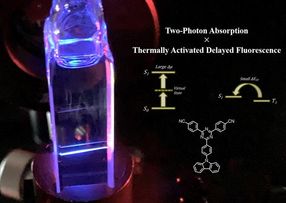Hydrogen transport with salt
Around 1 million euros in funding for Wismar University of Applied Sciences in the project for innovative hydrogen storage based on formate salts:
On 8 August 2025, Dr. Wolfgang Blank, Minister for Economic Affairs, Infrastructure, Tourism and Employment of Mecklenburg-Vorpommern, presented the funding decision for the new joint R&D project "FormaPort - Development of a novel hydrogen transport medium based on formate salts" at the Leibniz Institute for Catalysis (LIKAT) in Rostock. The aim of the project is to develop an economical and technologically efficient system for the safe storage and transportation of hydrogen.
Innovation potential and ecological benefits
While historic sailing ships are attracting everyone's attention as a means of transportation on Rostock's waters during the HanseSail, a means of transportation of the future is the focus of an event in Rostock's Südstadt district: formate salt. Formate as a chemical energy carrier is characterized by its environmental compatibility and, with the help of catalytic processes, enables both safe storage and the release of hydrogen as required. In view of the steadily growing importance of hydrogen as an energy source, the "FormaPort" system to be developed is intended to offer a sustainable alternative to conventional storage methods. "We are delighted to be actively promoting the development of innovative hydrogen storage technologies in Mecklenburg-Vorpommern," emphasized Economics Minister Dr. Blank when handing over the funding decision. "FormaPort can make an important contribution to advancing the energy transition and sustainably strengthening the infrastructure for green hydrogen."
Excellent research conditions in Wismar and on Poel
The experts from research and industry who are coming together in the FormaPort project include scientists from the Department of Mechanical/Process and Environmental Engineering at the Faculty of Engineering at Wismar University of Applied Sciences. "The interdisciplinary collaboration between the project partners forms the basis for the development of a robust and scalable transportation and storage system. We are convinced that the results of FormaPort can set new standards in hydrogen logistics," says Professor Dr.-Ing. Mathias Wilichowski, who is providing scientific support for the project at Wismar University of Applied Sciences. The funding sum of 1,078 million euros also enables the involvement of young scientists. A Wismar graduate of the Bachelor's degree course in Process Engineering - Energy, Environmental and Biotechnology and the subsequent Master's degree course in Mechanical Engineering | Process and Energy Engineering will start his research work under the supervision of project manager Prof. Dr.-Ing. Christian Stollberg with the aim of writing a doctoral thesis. The basis for this is the cooperative doctoral procedure, which is offered at Wismar University of Applied Sciences to promote young scientists. At the end of the year, the research team will be joined by a post-doctoral student. The modern laboratories for process, environmental and biotechnology both on the Wismar campus and at the Malchow site on the island of Poel offer excellent conditions for the work in the FormaPort project.
Note: This article has been translated using a computer system without human intervention. LUMITOS offers these automatic translations to present a wider range of current news. Since this article has been translated with automatic translation, it is possible that it contains errors in vocabulary, syntax or grammar. The original article in German can be found here.
Other news from the department science

Get the chemical industry in your inbox
By submitting this form you agree that LUMITOS AG will send you the newsletter(s) selected above by email. Your data will not be passed on to third parties. Your data will be stored and processed in accordance with our data protection regulations. LUMITOS may contact you by email for the purpose of advertising or market and opinion surveys. You can revoke your consent at any time without giving reasons to LUMITOS AG, Ernst-Augustin-Str. 2, 12489 Berlin, Germany or by e-mail at revoke@lumitos.com with effect for the future. In addition, each email contains a link to unsubscribe from the corresponding newsletter.




























































